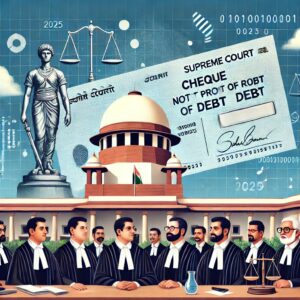The Mere Issuance of a Cheque Does Not Automatically Establish a Legally Enforceable Debt or Liability
Introduction
Revealed: 7 Reasons Why a Cheque Isn’t Proof of Debt | 2025

Cheque Not Proof of Debt / Why a Cheque Isn’t Proof of Debt : In modern commercial transactions, cheques are a widely used method for payment. However, the legal consequences of a cheque dishonour, especially under Section 138 of the Negotiable Instruments Act, 1881 (NI Act), have significant implications. A common misconception is that the issuance of a cheque itself proves a legally enforceable debt. This blog will explore why that assumption is flawed, the statutory provisions under the NI Act, judicial interpretations, and how the burden of proof lies on the complainant to establish the existence of an actual debt or liability.
Understanding the Legal Framework: Section 138 of the NI Act
Section 138 of the NI Act criminalizes the dishonour of cheques for insufficiency of funds or if it exceeds the arrangement with the bank. It is designed to ensure the credibility of negotiable instruments and to provide a remedy to the payee.
Essential Ingredients of Section 138:
-
Cheque must be drawn for the discharge of a legally enforceable debt or liability.
-
The cheque is returned by the bank due to insufficient funds or if it exceeds the arrangement.
-
The payee issues a demand notice within 30 days of receiving bank intimation.
-
The drawer fails to make payment within 15 days of receiving the notice.
Core Issue:
The statute emphasizes that the cheque must be issued in discharge of a legally enforceable debt or liability. Hence, the key phrase here is “legally enforceable debt.”
Legally Enforceable Debt: What Does It Mean?
A legally enforceable debt is an obligation that the law recognizes and for which the creditor can take legal action to recover it. A cheque issued for future debt, or as a gift or donation, does not fall under this ambit. Courts have consistently held that the complainant must establish that such a debt exists at the time the cheque was issued.
Presumption under Section 139 of NI Act
Section 139 of the NI Act creates a presumption in favour of the holder of the cheque:
“It shall be presumed, unless the contrary is proved, that the holder of a cheque received it in the discharge, in whole or in part, of any debt or other liability.”
But It’s a Rebuttable Presumption
This presumption is not conclusive. The accused (drawer of the cheque) can rebut it by creating doubt about the existence of such a debt or liability.
Judicial Interpretations: Landmark Judgments
1. Krishna Janardhan Bhat v. Dattatraya G. Hegde (2008) 4 SCC 54
Facts:
The accused issued a cheque which was dishonoured. The complainant alleged it was towards a loan.
Judgment:
The Supreme Court ruled that the burden of proving the existence of a legally enforceable debt lies on the complainant. The accused can rebut the presumption under Section 139 by merely raising a probable defence.
Conclusion:
Issuance of cheque alone is insufficient to prove the existence of a legally enforceable debt.
2. Rangappa v. Sri Mohan (2010) 11 SCC 441
Facts:
A cheque was issued and dishonoured. The trial court convicted the accused; the High Court acquitted.
Judgment:
The Supreme Court clarified that the presumption under Section 139 includes the presumption of the existence of debt. However, this too can be rebutted.
Conclusion:
A probable defence by the accused suffices to rebut the presumption. The burden then shifts back to the complainant.
3. Basalingappa v. Mudibasappa (2019) 5 SCC 418
Facts:
Dispute regarding cheque issued for a disputed financial transaction.
Judgment:
The court reiterated that the burden to prove the foundational facts rests with the complainant. Only once this is done does the presumption under Section 139 arise.
Conclusion:
Initial burden on complainant; mere cheque not enough without proof of debt.
The Role of Evidence
To prove the existence of a legally enforceable debt, the complainant can rely on:
-
Loan agreements
-
Promissory notes
-
Account books
-
Acknowledgement letters
-
Bank statements
-
Witness testimony
Mere oral assertions or the cheque alone usually do not suffice unless supported by documentation or credible evidence.
Burden of Proof: Shift and Rebuttal
Complainant’s Role
-
Prove that the cheque was issued in discharge of a liability.
-
Produce evidence to show the existence of such liability.
Accused’s Role
-
Raise a probable defence (e.g., cheque was blank, lost, or given as security).
-
Use cross-examination to discredit the complainant’s case.
Courts Have Held:
-
The accused need not prove beyond reasonable doubt.
-
A probable defence can be established on a preponderance of probabilities.
Common Defences by Accused in Cheque Bounce Cases
-
Cheque issued as security, not towards debt.
-
No consideration was received.
-
Complainant failed to prove the loan.
-
Signature is forged.
-
Post-dated cheque not intended for immediate discharge.
Courts evaluate the totality of circumstances to assess the validity of these defences. Cheque Not Proof of Debt
Practical Impact on Legal Strategy
For Complainants:
-
Always document loan transactions or business dealings.
-
Secure receipts or acknowledgements.
-
Avoid issuing cheques without clarity on consideration.
For Accused:
-
Maintain records of transactions.
-
Preserve proof of repayment if any.
-
Ensure checks issued for security are labeled and documented as such.
Why the Law Favors a Presumption But Allows Rebuttal
The presumption under Section 139 is a legislative tool to ensure cheque-based payments are respected. However, the scope for rebuttal balances the interests of justice, preventing misuse of the law for coercion or blackmail.
FAQs
1. Does issuing a cheque prove that I owe someone money?
No. The cheque must be issued to discharge an existing and enforceable debt.
2. Who bears the burden of proof in a cheque bounce case?
Initially, the complainant. Once the existence of debt is shown, the presumption favors the complainant, but it can be rebutted by the accused.
3. Can I be convicted if I didn’t receive any consideration for the cheque?
Not if you can prove the lack of consideration or liability. That rebuts the presumption under Section 139.
4. Is a blank signed cheque considered valid proof of debt?
Not necessarily. If issued as security or without consideration, it may not establish enforceable debt.
5. What if the complainant has no written evidence of the debt?
That weakens the case. Courts prefer written evidence to establish liability.
Conclusion
Revealed: 7 Reasons Why a Cheque Isn’t Proof of Debt : The legal position is now settled: the mere issuance of a cheque does not automatically prove a legally enforceable debt. Section 138 must be read in conjunction with Section 139, keeping in mind the rebuttable nature of the presumption. Courts require credible evidence, and the burden of proving the existence of a legally enforceable debt rests primarily on the complainant. While the presumption helps prosecute genuine cases, it also ensures that the accused is not wrongfully convicted without fair evidence.
If you’re involved in a cheque bounce case, consult a legal expert to evaluate your specific facts, prepare your defence or complaint carefully, and rely on both legal and documentary evidence to support your position. Cheque Not Proof of Debt
📚 Primary Legal Resources (Statutory and Judicial):
-
The Negotiable Instruments Act, 1881
👉 Bare Act – India Code
Section 138 and Section 139 are especially relevant. -
Rangappa v. Mohan (2010) 11 SCC 441
Landmark Supreme Court ruling explaining presumption and rebuttal under Section 139 NI Act. -
Krishna Janardhan Bhat v. Dattatraya Hegde (2008) 4 SCC 54
Clarifies that mere issuance of a cheque does not prove legally enforceable debt. -
Indus Airways Pvt. Ltd. v. Magnum Aviation Pvt. Ltd. (2014) 12 SCC 539
Discusses cheques issued as security – not enforceable under Section 138.
📰 Secondary Legal Resources (Articles & Commentaries):
-
LiveLaw – https://www.livelaw.in
Covers latest Supreme Court decisions and expert analyses on cheque bounce cases. -
Bar & Bench – https://www.barandbench.com
Features legal updates, case studies, and interpretation of important judgments. -
Vakilno1 – https://www.vakilno1.com
Good for simplified summaries of Indian laws and recent judgments. -
SCC Online Blog – https://www.scconline.com/blog
Access law reports and high court & Supreme Court commentary on cheque-related cases. -
Legal Service India – https://www.legalserviceindia.com
User-friendly legal explanations and community-written case notes. -
Manupatra (Subscription-based) – https://www.manupatra.com
Comprehensive legal database for in-depth case research and commentaries.



